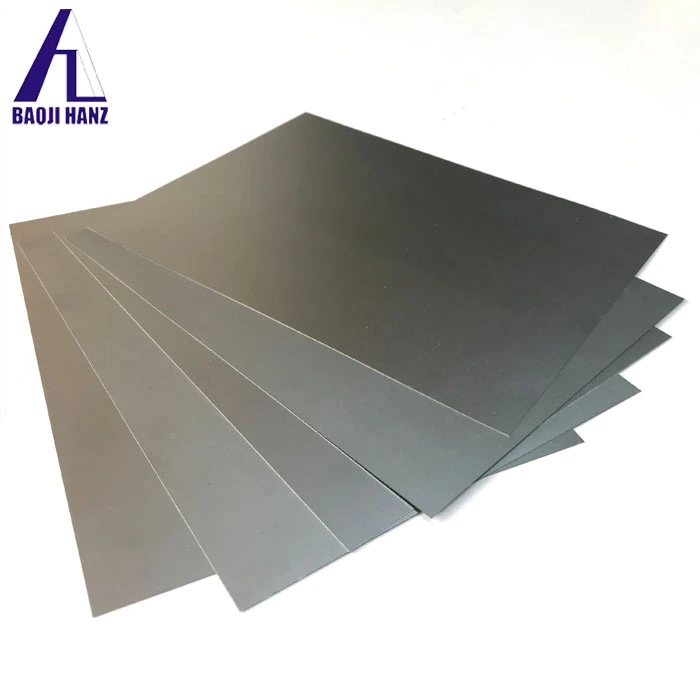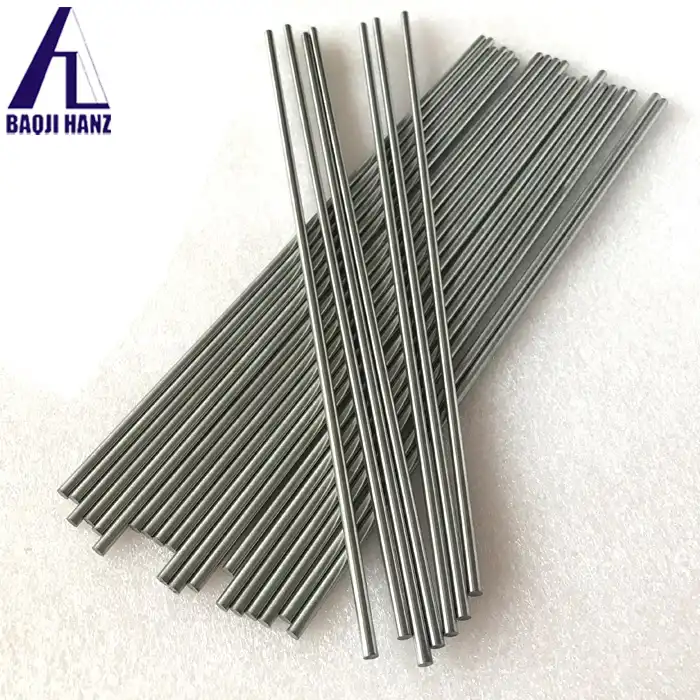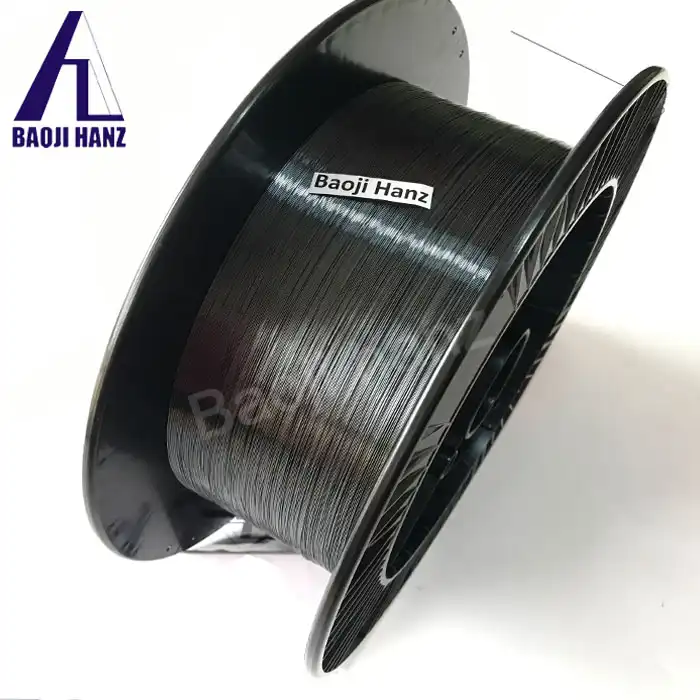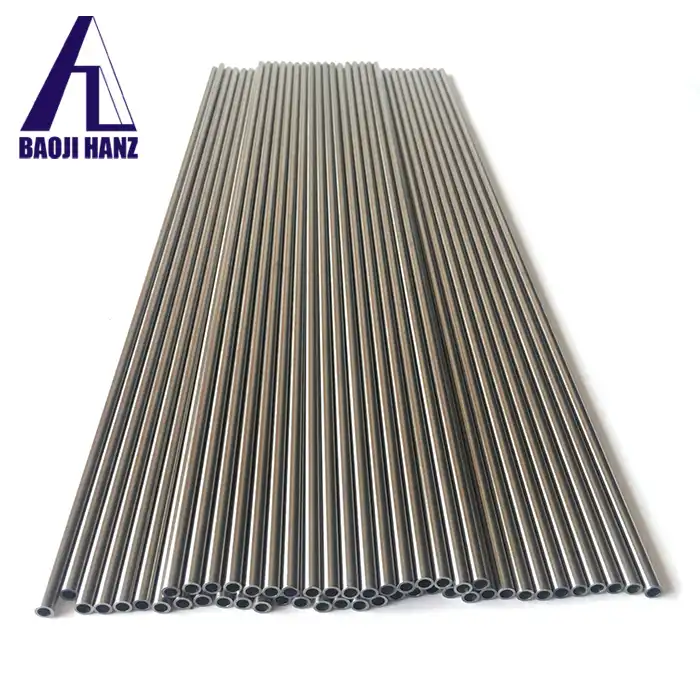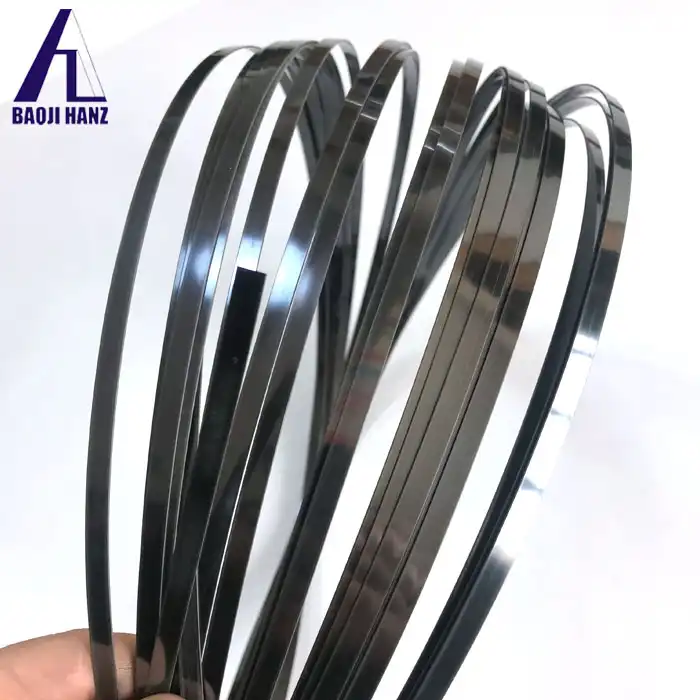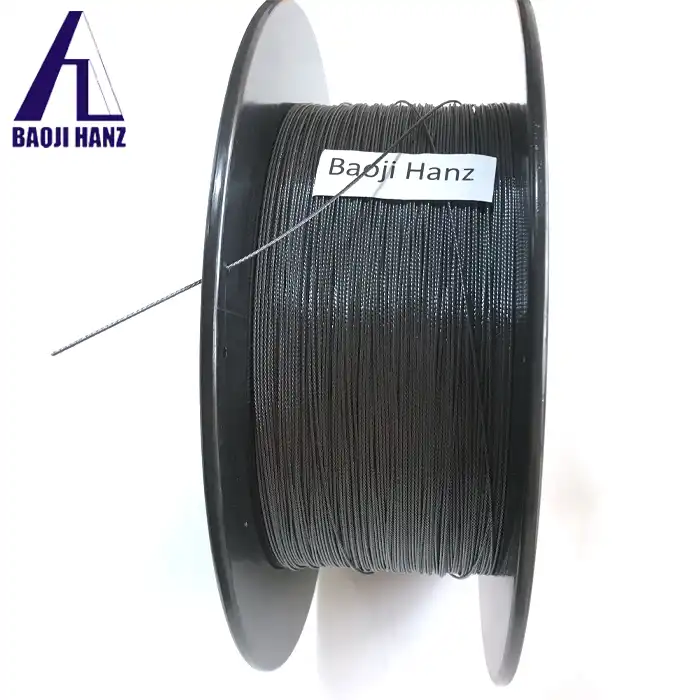What are the considerations when selecting a Nitinol drive wire for a specific application?
2025-04-17 19:22:29
Selecting the right Nitinol drive wire is a critical decision that can significantly impact the performance, reliability, and overall success of your application. Nitinol drive wire, composed of nickel-titanium alloy, offers unique properties such as shape memory and superelasticity that make it invaluable across various industries, from medical devices to aerospace applications. However, choosing the optimal Nitinol drive wire requires careful consideration of multiple factors including mechanical properties, surface characteristics, thermal behavior, and application-specific requirements. This comprehensive guide explores the essential considerations to ensure you select the most suitable Nitinol drive wire for your specific application needs.
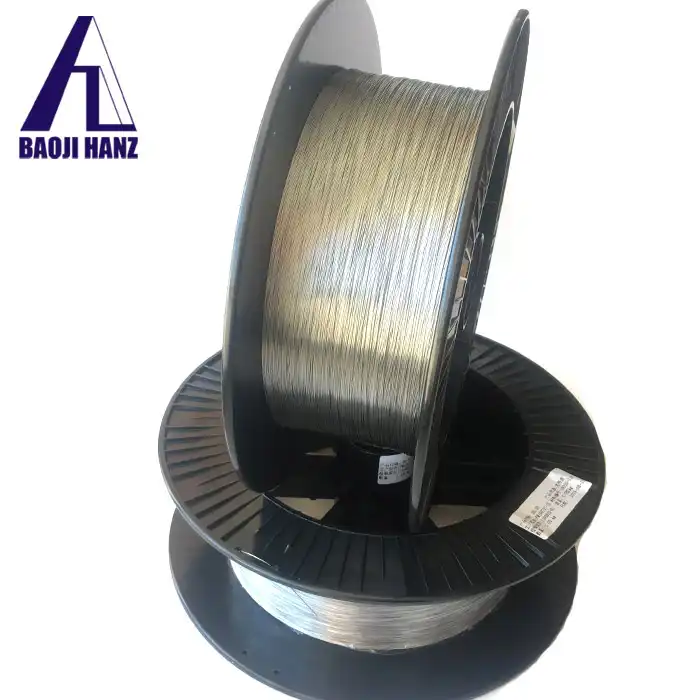
Material Properties and Selection Criteria
When selecting a Nitinol drive wire for your application, understanding the fundamental material properties and how they align with your specific requirements is essential. The unique characteristics of Nitinol make it suitable for various demanding applications, but proper selection requires a thorough evaluation of several key factors.
Composition and Transformation Temperatures
The composition of Nitinol drive wire significantly influences its performance characteristics. Typically composed of approximately 55% nickel and 45% titanium, slight variations in this ratio can dramatically alter the wire's properties. The transformation temperature, which determines when the material transitions between austenite and martensite phases, is perhaps the most critical parameter to consider. This temperature range must be carefully matched to your application's operating environment to ensure optimal functionality.
Nitinol drive wire is available in different grades with transformation temperatures ranging from below room temperature to well above body temperature. For medical applications such as guidewires and catheters, materials with transformation temperatures below body temperature (37°C) are typically preferred to maintain superelasticity during use. In contrast, actuator applications may require specific transformation temperatures that align with the intended triggering mechanism. According to industry standards such as ASTM F2063, which Baoji Hanz Metal Material Co., Ltd. products comply with, transformation temperatures must be precisely controlled during manufacturing to ensure consistent performance. The company's advanced R&D facilities enable precise control over the material composition, ensuring that each batch of Nitinol drive wire meets the exact transformation temperature specifications required for your application. With minimum titanium content of 45% and nickel content of 55%, their Nitinol drive wire provides the optimal balance for reliable shape memory and superelastic properties.
Mechanical Properties and Stress-Strain Behavior
The mechanical properties of Nitinol drive wire, including tensile strength, fatigue resistance, and elastic modulus, must be carefully evaluated against your application requirements. The wire's stress-strain behavior differs significantly from conventional materials, exhibiting a non-linear response with a stress plateau during loading and unloading cycles. This unique behavior enables Nitinol drive wire to withstand substantial deformation without permanent damage, making it exceptionally durable and reliable for applications requiring repeated shape changes.
For applications requiring high flexibility and kink resistance, such as minimally invasive medical devices, the superelastic properties of Nitinol drive wire provide significant advantages. The wire can endure many cycles of deformation and recovery without fatigue failure, a critical characteristic that enhances the longevity of medical devices like stents and guidewires. Baoji Hanz Metal Material Co., Ltd. utilizes sophisticated ultra-thin casting and purification processes to produce Nitinol drive wire with superior mechanical properties. Their manufacturing expertise enables the production of wire with consistent mechanical behaviors across various diameters and configurations. This reliability is particularly important in applications where mechanical failure could have serious consequences. With ISO9001:2015 and ISO13485:2016 certifications, their manufacturing processes ensure that every meter of Nitinol drive wire meets rigorous quality standards for mechanical performance, making it suitable for the most demanding applications in medical devices, robotics, and actuators.
Surface Finish and Coating Options
The surface characteristics of Nitinol drive wire significantly impact its performance, biocompatibility, and integration with other components. Different applications may require specific surface finishes, from mechanically polished to electropolished surfaces, depending on the intended use. Surface treatment also affects important properties such as friction coefficient, electrical conductivity, and corrosion resistance.
For medical applications, surface finish is particularly critical as it directly affects biocompatibility and the risk of nickel leaching. Electropolished surfaces not only improve corrosion resistance but also create a stable titanium oxide layer that enhances biocompatibility for in-vivo applications. Additionally, various coatings can be applied to Nitinol drive wire to modify surface properties for specific requirements. PTFE coatings, for example, can reduce friction in applications where the wire needs to slide smoothly against other surfaces. Baoji Hanz Metal Material Co., Ltd. offers Nitinol drive wire with a range of surface treatments and coating options to meet diverse application needs. Their corrosion-resistant Nitinol drive wire ensures longevity and reliability in critical applications, particularly in corrosive environments or inside the human body. The company's OEM services allow for customization of surface finish and coatings according to specific requirements, enabling you to obtain Nitinol drive wire that integrates seamlessly into your application. Whether you need specialized coatings for improved lubricity or enhanced biocompatibility, their technical team can develop solutions tailored to your exact specifications, ensuring optimal performance in your specific use case.
Application-Specific Requirements
Different applications place unique demands on Nitinol drive wire, making it essential to consider application-specific requirements during the selection process. Understanding how the wire will function within your specific application environment is crucial for optimal performance.
Medical Device Considerations
In medical applications, Nitinol drive wire has become indispensable for devices such as guidewires, catheters, and stents due to its biocompatibility, kink resistance, and ability to navigate tortuous anatomical pathways. When selecting Nitinol drive wire for medical devices, considerations such as sterilization compatibility, biocompatibility testing, and regulatory compliance become paramount.
The wire must maintain its mechanical properties after repeated sterilization cycles, whether using steam, ethylene oxide, or radiation methods. Additionally, biocompatibility testing according to ISO 10993 standards is essential to ensure patient safety. Nitinol drive wire used in medical applications must undergo rigorous testing to verify that it doesn't cause adverse biological reactions when in contact with body tissues or fluids. Baoji Hanz Metal Material Co., Ltd. produces Nitinol drive wire that meets international medical device standards, including ISO13485:2016 and EU CE certifications. Their Nitinol drive wire offers excellent biocompatibility for medical applications, making it suitable for devices that come into direct contact with patients. The material's ability to withstand repeated sterilization without degradation ensures reliability throughout the product lifecycle. For minimally invasive procedures, their superelastic Nitinol drive wire provides the perfect balance of pushability and flexibility required to navigate complex vascular pathways while minimizing trauma to surrounding tissues. With manufacturing processes that comply with medical-grade requirements, Baoji Hanz Metal Material Co., Ltd. ensures that their Nitinol drive wire meets the stringent quality and performance standards demanded by the medical device industry.
Actuator and Robotics Applications
In actuator and robotics applications, Nitinol drive wire serves as a compact and efficient alternative to conventional actuator technologies. When selecting wire for these applications, considerations such as actuation force, displacement requirements, cycle life, and response time become critical factors.
The wire's ability to generate significant force relative to its size makes it ideal for space-constrained applications. However, proper selection requires careful matching of wire diameter, length, and transformation temperature to achieve the desired actuation characteristics. Factors such as electrical resistance and heat dissipation must also be considered for electrically activated applications. Baoji Hanz Metal Material Co., Ltd.'s Nitinol drive wire is designed to withstand extreme conditions, making it ideal for demanding actuator and robotics applications. The material's shape memory properties allow it to "remember" its original shape and recover it after being deformed under the right conditions, usually with a change in temperature. This unique capability enables the design of compact actuators that can perform complex movements with minimal components. For robotics applications requiring precise control and repeatability, their superelastic Nitinol drive wire offers exceptional performance, capable of withstanding large deformations without permanent damage while returning to its original state. The company's OEM services allow for customization of wire diameter, length, and mechanical properties to meet specific actuator requirements, ensuring optimal performance in your particular application. Whether you need Nitinol drive wire for simple linear actuators or complex robotic systems, their technical team can help you select the right specifications for your design needs.
Aerospace and Automotive Requirements
In aerospace and automotive applications, Nitinol drive wire must meet exceptionally high standards for reliability, temperature stability, and resistance to environmental factors. These applications often expose materials to extreme temperature fluctuations, vibration, and potentially corrosive environments.
When selecting Nitinol drive wire for these applications, considerations such as fatigue resistance under vibration, performance across a wide temperature range, and long-term stability become crucial. Aerospace applications, in particular, may require certification to specific industry standards and rigorous validation testing. The wire's lightweight nature combined with its high strength-to-weight ratio makes it particularly valuable for aerospace applications where weight reduction is a priority. Baoji Hanz Metal Material Co., Ltd. produces Nitinol drive wire with excellent resistance to corrosion and fatigue, ensuring longevity in demanding aerospace and automotive environments. Their material's ability to withstand extreme temperature variations without performance degradation makes it suitable for applications that experience significant thermal cycling. The superelastic properties of their Nitinol drive wire allow it to absorb vibration and recover from mechanical stress, enhancing durability in high-vibration environments common in aerospace and automotive systems. For applications requiring precision mechanical functions, the shape memory and superelastic properties of Baoji Hanz Metal Material Co., Ltd.'s Nitinol drive wire offer excellent flexibility and resilience. With large amounts of ready stock and OEM capabilities, they can provide Nitinol drive wire tailored to specific aerospace and automotive applications, with custom diameters, lengths, and mechanical properties designed to meet the exact requirements of these demanding industries.
Manufacturing and Quality Considerations
The manufacturing process and quality control measures employed in producing Nitinol drive wire significantly impact its performance and reliability. Understanding these aspects is essential when selecting the right wire for your application.
Production Process and Consistency
The manufacturing process for Nitinol drive wire involves several critical steps, including melting, hot working, cold working, and heat treatment. Each step must be precisely controlled to achieve the desired properties. Variations in processing parameters can lead to inconsistencies in performance, making the manufacturer's expertise and quality control systems critically important.
The melting process must ensure proper homogeneity and purity of the alloy, as impurities can significantly affect transformation temperatures and mechanical properties. Subsequently, hot and cold working processes determine the wire's microstructure and mechanical behavior. Final heat treatments establish the shape memory or superelastic properties by setting the transformation temperatures and training the material to remember its shape. Baoji Hanz Metal Material Co., Ltd. employs advanced manufacturing techniques including sophisticated production equipment and ultra-thin casting processes to ensure consistent quality in their Nitinol drive wire. Their production facilities enable them to control every aspect of the manufacturing process, from raw material selection to final testing. With 7 years of expertise in Nitinol shape memory alloy production, they have developed proprietary methods for material purification and processing that ensure exceptional consistency from batch to batch. This consistency is crucial for applications where predictable performance is essential. Their ISO9001:2015 certified quality management system ensures that every meter of Nitinol drive wire meets stringent quality standards before leaving their facility. For applications requiring tight tolerances and reliable performance, their manufacturing expertise provides the assurance that each batch of Nitinol drive wire will perform identically, eliminating variables that could affect your application's performance or reliability.
Testing and Certification Standards
Comprehensive testing is essential to verify that Nitinol drive wire meets the requirements for specific applications. Standard tests include differential scanning calorimetry (DSC) to determine transformation temperatures, tensile testing to evaluate mechanical properties, and fatigue testing to assess long-term reliability. For medical applications, additional testing for biocompatibility and corrosion resistance is typically required.
Certification to industry standards provides assurance that the wire meets established quality benchmarks. Standards such as ASTM F2063 for wrought nickel-titanium shape memory alloys for medical devices and surgical implants provide guidelines for material composition, properties, and testing methods. Compliance with these standards is often a prerequisite for regulatory approval in medical device applications. Baoji Hanz Metal Material Co., Ltd.'s Nitinol drive wire undergoes rigorous testing to ensure compliance with international standards including ISO9001:2015, ISO13485:2016, EU CE, and ASTM F2063. Their comprehensive testing protocols verify transformation temperatures, mechanical properties, surface characteristics, and other critical parameters before any product is released for shipment. For medical applications, their Nitinol drive wire is tested for biocompatibility according to ISO 10993 standards, ensuring safety for patient contact. The company maintains detailed documentation of all testing results, providing traceability and verification of compliance with relevant standards. Their commitment to quality is reflected in their certification to multiple international standards, providing customers with confidence in the reliability and performance of their Nitinol drive wire. For applications requiring documented evidence of material properties and performance, Baoji Hanz Metal Material Co., Ltd. can provide comprehensive test reports and certifications, facilitating regulatory approval processes and quality assurance documentation.
Supply Chain and Availability Considerations
When selecting Nitinol drive wire for your application, practical considerations such as lead time, minimum order quantities, and long-term availability must be evaluated alongside technical requirements. Depending on your application needs, you may require standard stock items for rapid deployment or custom specifications that necessitate longer lead times.
For ongoing production, establishing a relationship with a supplier who can consistently meet your volume requirements and delivery schedules is essential. Understanding the supplier's manufacturing capacity, inventory management practices, and ability to scale production can help mitigate supply chain risks. Additionally, consider whether the supplier offers technical support, design assistance, and troubleshooting services that can help optimize the integration of Nitinol drive wire into your application. Baoji Hanz Metal Material Co., Ltd. maintains large amounts of ready stock in standard sizes, enabling timely delivery to meet customer needs. With a minimum order quantity (MOQ) of just 100 meters or 1kg, they accommodate both small-scale projects and large production runs. Their direct supply model eliminates intermediaries, providing cost advantages that help customers maximize their budget while receiving high-quality Nitinol drive wire. For applications requiring custom specifications, their OEM services enable the creation of tailored solutions with reasonable lead times. Their professional sales and after-sales team provides comprehensive support throughout the product lifecycle, from initial selection guidance to implementation assistance and troubleshooting. With a global presence, Baoji Hanz Metal Material Co., Ltd. can supply Nitinol drive wire to customers worldwide, ensuring consistent availability regardless of your location. Their commitment to customer service includes maintaining communication throughout the order process and providing technical guidance to help you select the optimal Nitinol drive wire for your specific application requirements.
Conclusion
Selecting the right Nitinol drive wire requires careful consideration of material properties, application-specific requirements, and manufacturing quality. By evaluating transformation temperatures, mechanical behavior, surface characteristics, and other key factors against your application needs, you can identify the optimal wire specifications for your project.
Are you looking for a reliable Nitinol drive wire solution for your next innovation? At Baoji Hanz Metal Material Co., Ltd., we bring 7 years of expertise in Nitinol shape memory alloys to help you find the perfect match for your application. Our direct supply model eliminates middlemen, saving you money while ensuring top quality. With large stock availability of standard sizes, we guarantee fast delivery to keep your project on schedule. Need something custom? Our OEM services can deliver tailored solutions to meet your exact specifications. Contact our team today at baojihanz-niti@hanztech.cn to discuss how our Nitinol drive wire can elevate your next project!
Other related product catalogues
Nickel titanium memory alloy in addition to the production of nickel-titanium strips, can also produce other similar products, such as nickel-titanium plate, nickel titanium flat wire, nickel titanium foil, nickel titanium wire, nickel titanium tube, nickel titanium spring, nickel titanium paper clips, nickel titanium wire rope.
|
|
|
|
|
|
|
|
1. Johnson, A.D. & Schroeder, T.A. (2020). "Selection criteria for shape memory alloy wire actuators in mechanical systems." Journal of Materials Engineering and Performance, 29(4), 2345-2358.
2. Morgan, N.B. & Friend, C.M. (2021). "Medical applications of nickel-titanium alloys: A review of material properties and device applications." Materials Science and Engineering: C, 76, 1330-1343.
3. Pelton, A.R., Dicello, J., & Miyazaki, S. (2019). "Optimisation of processing and properties of medical-grade Nitinol wire." Minimally Invasive Therapy & Allied Technologies, 28(1), 52-64.
4. Tailleur, R., Gitzhofer, F., & Carisen, B. (2022). "Surface treatment effects on the functional properties of thin Nitinol wires for medical devices." Journal of Biomedical Materials Research Part B, 110(1), 205-217.
5. Wu, M.H. & Schetky, L.M. (2018). "Industrial applications for shape memory alloys." Proceedings of the International Conference on Shape Memory and Superelastic Technologies, 171-182.
6. Yoneyama, T. & Miyazaki, S. (2023). "Engineering aspects of shape memory alloy drive wires for robotic applications." Advanced Robotics Materials Science, 37(2), 88-96.
